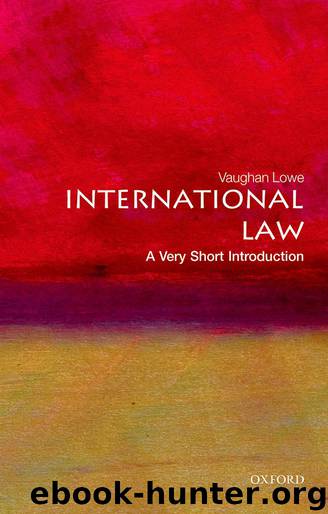International Law: A Very Short Introduction by Vaughan Lowe

Author:Vaughan Lowe
Language: eng
Format: epub
ISBN: 9780199239337
Publisher: OUP Oxford
Published: 2015-10-01T04:00:00+00:00
Fighting on the right occasions: the just war
The development of the jus in bello throughout modern history has been essentially in one direction: towards the increasingly strict limitation of permissible weapons and methods of war to those which serve the four key principles—military necessity, distinction, proportionality, and humanity. The development of the jus ad bellum, on the other hand, has a less clear trajectory. For most of the 20th century the trend was towards the limitation of the circumstances in which war could properly be used as an instrument of foreign policy. But in the past decade or so there have been clear signs of a partial reversal of that trend. Nonetheless, the basic view that armed force may be used against other States only in very limited circumstances remains unchallenged.
The ‘Just War’ doctrine, refined by Thomas Aquinas, writing within the Judaeo-Christian tradition, is among the best-known articulations in the English-speaking world of what became the jus ad bellum; but it is by no means the only or the oldest such tradition. For example, over a thousand years ago Shaybānı, who lived and worked in what is now Iraq, wrote in his Siyar of the constraints on the use of force against other peoples; and centuries before even that, the Bhagavad Gita reflected the distinction drawn in Hinduism between righteous and unrighteous wars. Much effort was expended in crafting justifications for particular wars around such criteria. The speech given by Archbishop Chichele (after whom the Oxford chair in international law is named) in Act 1 of Shakespeare’s Henry V in order to justify the war against France is but one example of the seriousness with which such exercises were taken—and an eerie foreshadowing of the tortured explanations of the justification for the war against Iraq in 2003.
The importance of there being a reasoned justification for the waging of a war appears to have been relatively constant throughout history—unsurprisingly, given that even individual homicides have, it seems, always been thought to demand some justification if they are not to be treated as serious crimes. What has changed, however, is the nature of the justification. Whereas the just war theorists focused upon substantive justifications for international wars, by the end of the 20th century the emphasis had moved from substance to procedure.
Download
This site does not store any files on its server. We only index and link to content provided by other sites. Please contact the content providers to delete copyright contents if any and email us, we'll remove relevant links or contents immediately.
The Pirates of Somalia by Jay Bahadur(1642)
Political Theology by Carl Schmitt(1586)
The Holocaust: A New History by Laurence Rees(1529)
The Social Animal by David Brooks(1459)
A Practical Guide to International Arbitration in London by Hilary Heilbron(1441)
Restitution by Restitution(1428)
Pirates of Somalia by Jay Bahadur(1388)
Coercing Virtue by Robert H. Bork(1361)
The Nuremberg Interviews by Leon Goldensohn(1307)
Basic International Corporate Taxation by Sebastiano Garufi(1221)
A History Of Thailand by Baker Chris(1198)
International Trade and Business: Law, Policy and Ethics by Gabriël Moens & Peter Gillies(1152)
The Global Commons by Susan J. Buck(1141)
Blood Profits by Vanessa Neumann(1122)
Asian Waters by Humphrey Hawksley(1117)
The Sovereignty of Human Rights by Macklem Patrick(1115)
Spring Fever: The Illusion of Islamic Democracy by McCarthy Andrew C(1110)
The Nuremberg Trials: The Nazis and their Crimes Against Humanity by Roland Paul(1055)
Crimes Against Humanity: Historical Evolution and Contemporary Application by M. Cherif Bassiouni(1030)
